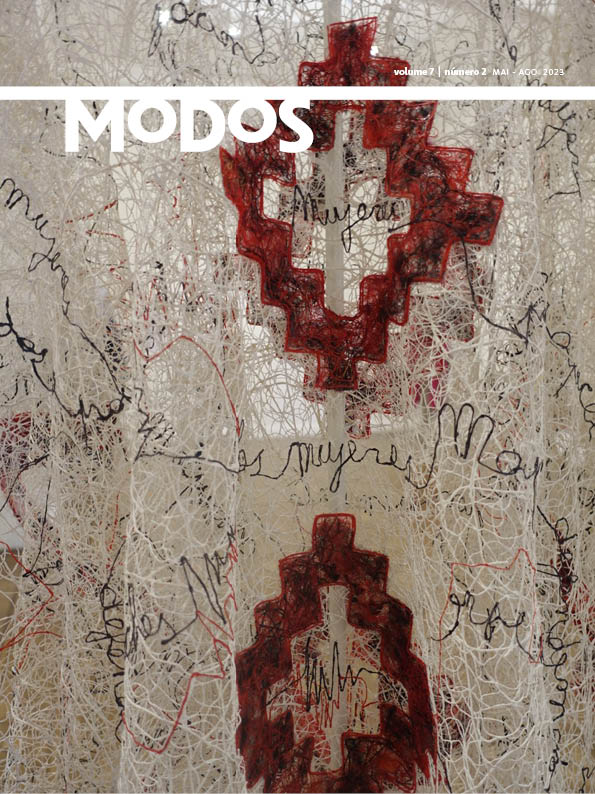Abstract
Tunisian women have an almost equal legal status, which is an exceptional situation in the Arab-Islamic world. This statute is the result, above all, of the female emancipation policy promoted by former Prime Minister and former President Habib Bourguiba, who gave himself the nickname “The Liberator of Women". However, the Tunisian women filmmakers of the first generation, made up of Selma Baccar, Nejia Ben Mabrouk, Moufida Tlatli and Kalthoum Bornaz, produced a feminist cinematographic counter-discourse that questioned both the limits of said emancipation and the reappropriation of Tunisian women's history by part of Bourguiba. This text is a brief study on the construction of this counter-discourse through the historical reading of documents and testimonies of these filmmakers, from the perspective of the history of women and gender and the feminism of equality, difference and/or situationism, as categories of analysis.
References
AYARI, M. B. y BARGAOUI, S. B. (dirs.). Après l’indépendence. Parcours et discours. Túnez: Laboratoire de Recherche Diraset-Arabesques Éditions, 2010.
BACCAR, S. Diptyque de Fatma 75. Túnez, s. f.
BACCAR, S. Entrevista con Samira Dami. In : GABOUS, A. Silence, elles tournent ! Les femmes et le cinéma en Tunisie. Túnez: Cérès Éditions-CREDIF, 1998, pp. 84-87.
BACCAR, S. Entrevista con el autor. Túnez, 2006a.
BACCAR, S. Note d’intention de Khochkhach-Fleur d’oubli. Túnez, 2006b.
BACCAR, S. Note d’intention d’El Jaida. Túnez, 2017.
BACCAR BOURNAZ, A. (ed.). Kalthoum Bornaz. L’étoile à la recherche du fil perdu. Túnez: Edición a cargo de la autora, 2017.
BEDJAOUI, S. Entrevista con Wassyla Tamzali. In: TAMZALI, W. En attendant Omar Gatlato. Regards sur le cinéma algérien suivi d’introduction fragmentaire au cinéma tunisien. Alger: Éditions En. A.P., 1978, pp. 203-205.
BELHASSEN, S. Femmes tunisiennes islamistes. Annuaire de l’Afrique du Nord, XVIII, 1980, pp. 77-94.
BEN KHADER, N. Entrevista con Michel Camau y Vincent Geisser. In: CAMAU, M. y GEISSER, V. (dirs.). Habib Bourguiba. La trace et l’héritage. París: Éditions Karthala, 2004, pp. 533-548.
BEN MABROUK, N. Entrevista con Françoise Wera. Ciné-Bulles, 8 (3), pp. 20-23, 1989.
BEN MABROUK, N. Entrevista con Sarra Daldoul. In: GABOUS, A. Silence, elles tournent ! Les femmes et le cinéma en Tunisie. Túnez: Cérès Éditions-CREDIF, 1998, pp. 91-98.
BESSIS, S. Les Valeureuses. Cinq Tunisiennes dans l’Histoire. Túnez: Éditions Elyzad, 2017.
BORNAZ, K. Entrevista con Hamadi Guerroum. In: GABOUS, A. Silence, elles tournent ! Les femmes et le cinéma en Tunisie. Túnez: Cérès Éditions-CREDIF, 1998a, pp. 111-114.
BORNAZ, K. Note d’intention de Keswa-Le Fil perdu. Túnez, 1998b
BORNAZ, K. Entrevista con el autor. Túnez, 2008a.
BORNAZ, K. Note d’intention de Shtar M’haba-L’Autre moitié du ciel. Túnez, 2008b.
BOURGUIBA, H. Les missions des femmes. In: BOURGUIBA, H. Discours, 1962-1963, vol. 10. Túnez: Secrétariat d’État à l’Information, 1974, pp. 193-207.
BOURGUIBA, H. Citations choisies par l’Agence Tunis-Afrique press. Túnez: Éditions Dar el Amal, 1978.
BOURGUIBA, H. Harmoniser les rôles sociaux des femmes. In: BOURGUIBA, H. Discours, 1974-1981, vol. 24. Túnez: Secrétariat d’État à l’Information, 1981, pp. 234-239.
CHARFI, M. Mon combat pour les Lumières. Lunay (Francia): Zellige, 2009.
CHATER, S. Les émancipées du Harem. Regard sur la femme tunisienne. Túnez: Éditions La Presse, 1992.
GABOUS, A. Silence, elles tournent ! Les femmes et le cinéma en Tunisie. Túnez: Cérès Éditions-CREDIF, 1998.
GEISSER, V. y HAMROUNI, C. Bourguiba dans la mémoire islamiste tunisienne. In: CAMAU, M. y GEISSER, V. (dirs.). Habib Bourguiba. La trace et l’héritage. París: Éditions Karthala, 2004, pp. 371-389.
HADDAD, R. Parole de femme. Túnez: Éditions Elyssa, 1995.
HAJJI, L. Bourguiba et l’islam. Le politique et le religieux. Túnez: Sud Éditions, 2011.
HAOUALA, H. Les Tunisiennes font leur cinéma. Túnez: Éditions Nirvana, 2023.
KHELIL, H. Le Parcours et la trace. Témoignages et documents sur le cinéma tunisien. Salammbô (Túnez): MediaCom, 2002.
MESTIRI, A. Témoignage pour l’Histoire. Túnez: Sud Éditions, 2011.
TAMZALI, W. En attendant Omar Gatlato. Regards sur le cinéma algérien suivi d’introduction fragmentaire au cinéma tunisien. Alger: Éditions En. A.P., 1979.
TLATLI, M. Entrevista con Maryem Skandrani. In: GABOUS, A. Silence, elles tournent ! Les femmes et le cinéma en Tunisie. Túnez: Cérès Éditions-CREDIF, 1998, pp. 156-158.
TLATLI, M. Entrevista con Jordi Esteva. In: ESTEVA, J. Mil y una voces. El islam, una cultura de la tolerancia contra el integrismo. Barcelona: Círculo de Lectores, 1999, pp. 141-152.
TLATLI, M. Entrevista con Hedi Khelil. In: KHELIL, H. Le Parcours et la trace. Témoignages et documents sur le cinéma tunisien. Salammbô (Túnez): MediaCom, 2002, pp. 181-207.
VV.AA. Femmes et République: un combat pour l’égalité et la démocratie. Túnez: Association Tunisienne des Femmes Démocrates, 2008.
VV.AA. Catalogue du cinéma tunisien. Túnez: Ministère de la Culture, 2010.
VV.AA. Bnet essyassa. Détenues politiques. Récits de militantes de gauche/Perspectives-El Amel Ettounsi. Les années 1970. Túnez: Zanoobya, 2021.

This work is licensed under a Creative Commons Attribution-NonCommercial-ShareAlike 4.0 International License.
Copyright (c) 2023 Javier Socías Baeza

